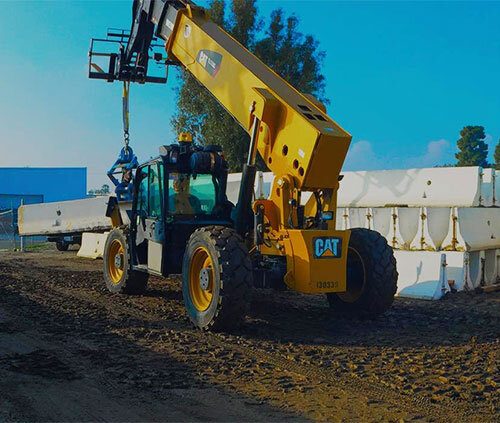Construction Equipment Rentals: Heavy Duty Machinery for Your Projects
Construction Equipment Rentals: Heavy Duty Machinery for Your Projects
Blog Article
Optimize Your Budget Plan by Understanding the Prices Connected With Building Tools Rentals
Understanding the full extent of costs linked with building and construction devices services is essential for maximizing your spending plan. What approaches can be utilized to efficiently manage these expenses and ensure a much more reliable rental experience?
Summary of Rental Prices
When considering building equipment services, comprehending the associated prices is paramount for reliable budgeting and task preparation. Rental expenses can differ significantly based on several elements, including devices type, duration of service, and location. The first rental fee commonly shows the devices's market need and its associated operational capacities, influencing the general expenditure.
In addition to the base rental price, secondary prices may arise, such as transportation charges, fuel additional charges, and maintenance fees. It is vital to account for these extra expenditures to precisely assess the overall cost of renting out tools. Moreover, the rental duration can impact pricing; longer rentals might get affordable prices, while temporary rentals could incur higher everyday fees.

Breakdown of Rental Rates
A comprehensive understanding of rental rates is important for specialists and project managers aiming to enhance their spending plans. Rental rates for building and construction equipment generally contain several parts, including base prices, time-based costs, and usage fees.
Base prices are the core charges associated with the service of the tools, usually identified by the kind and dimension of the machinery. These rates can differ substantially, affected by variables such as equipment demand, schedule, and local market trends. Time-based charges, which may be daily, weekly, or monthly, offer to suit various task timelines and rental durations.
Additionally, rental prices may consist of usage fees, which are applicable when devices is made use of past a specified limit, guaranteeing that the rental firm can make up damage. Seasonal demand fluctuations can likewise impact rental rates, with peak building periods typically commanding higher rates.
In addition, comprehending the rental firm's plans concerning maintenance and insurance coverage can provide additional understanding right into the overall expense structure. By examining these parts, specialists can make educated decisions, ensuring the choice of rental equipment straightens with both task needs and spending plan restrictions.
Additional Fees to Take Into Consideration
Understanding the complexities of added charges is critical for specialists to handle their total leasing expenditures efficiently. Past the typical rental prices, different additional costs can substantially affect the overall expense of devices service. These charges usually consist of delivery and pick-up charges, which can differ based upon distance and logistics associated with transporting the tools to and from the task website.
Furthermore, some rental companies may enforce gas additional charges if the equipment is returned with much less gas than when rented. It is also important to understand potential cleansing fees, specifically for specialized tools that requires complete upkeep after use.

Thoroughly assessing the rental arrangement and making clear these added fees in advance can help service providers prevent unforeseen expenses and make sure that spending plans continue to be undamaged throughout the project lifecycle.
Maintenance and Repair Service Expenses
Normal maintenance and repair expenditures are often forgotten aspects that can dramatically affect the general price of building tools leasings. When renting equipment, it is vital to take into consideration not just the rental fees but likewise the possible costs connected with keeping the machinery in ideal operating condition.
Lots of rental firms consist of basic maintenance as component of the rental contract; however, much more unanticipated failures or considerable repair services can result in extra expenditures. It's important to review the rental agreement very carefully to understand what maintenance services are covered and what responsibilities drop on the occupant.
Moreover, devices that is not well-kept can bring about inefficiencies on the job site, possibly enhancing and causing delays project expenses. To alleviate these risks, it is a good idea to perform routine inspections and maintain open communication with the rental company concerning any issues that occur throughout usage.
Insurance Policy and Liability Prices
Insurance coverage and obligation prices are vital parts that can dramatically affect the overall expense of building and construction tools services (mini excavator rental). These prices ensure that both the rental company and the client are shielded from possible monetary losses occurring from crashes, damages, or theft during the rental duration

In addition, clients need to know any kind of deductibles or exemptions in the insurance policy, as these can impact potential out-of-pocket expenses. Understanding the terms of any type of insurance policy protection is essential to avoid unanticipated prices. Ultimately, budgeting for insurance policy and obligation this contact form expenses can assist make sure check my blog a smoother rental experience and shield against financial threats connected with building and construction projects.
Final Thought
In conclusion, a thorough understanding of the expenses connected with construction devices leasings is necessary for effective budget monitoring. Eventually, notified decision-making relating to equipment leasings contributes to the general success of construction undertakings.
Rental prices can vary considerably based on numerous aspects, including equipment kind, period of leasing, and area (rental company near me). The rental duration can impact rates; longer leasings might certify for affordable rates, while temporary services may sustain greater day-to-day costs
By carrying out thorough research and engaging with reputable rental firms, specialists can efficiently navigate the intricacies of rental pricing, inevitably maximizing their financial resources.
Past the common rental rates, various additional charges can substantially impact the total cost of devices service. Rental firms commonly supply responsibility insurance coverage that covers injuries to small pile driving equipment 3rd parties or damage to property, while equipment damage insurance policy can cover the expense of fixings or substitute if the rented out tools is damaged.
Report this page